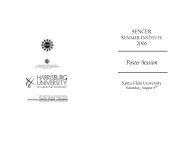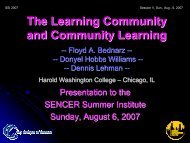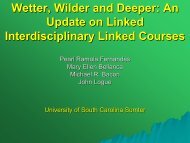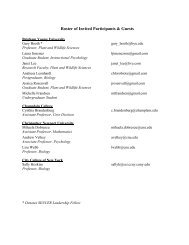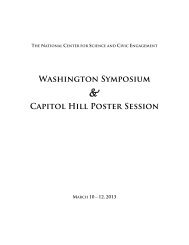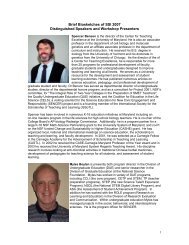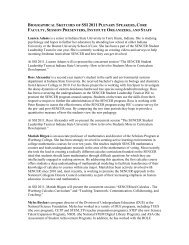Biosketches of invited speakers, Institute facilitators, and ... - SENCER
Biosketches of invited speakers, Institute facilitators, and ... - SENCER
Biosketches of invited speakers, Institute facilitators, and ... - SENCER
Create successful ePaper yourself
Turn your PDF publications into a flip-book with our unique Google optimized e-Paper software.
Glenn Odenbrett is a nationally recognized leader in the area <strong>of</strong> integrating community service with<br />
undergraduate coursework, <strong>and</strong> regularly serves as either a coordinator or campus team facilitator for<br />
conferences <strong>and</strong> training institutes in this area. In 1998, he organized <strong>and</strong> hosted a national institute on<br />
service learning in the science, engineering, <strong>and</strong> mathematics disciplines, <strong>and</strong> has presented workshops on<br />
this topic at previous <strong>SENCER</strong> Summer <strong>Institute</strong>s. During his 11-year tenure as director <strong>of</strong> the Office <strong>of</strong><br />
Student Community Service at Case Western Reserve University, he coordinated faculty development<br />
initiatives that promoted service-learning <strong>and</strong> community-based research across the undergraduate<br />
curriculum. In March <strong>of</strong> 2009, as a <strong>SENCER</strong> Leadership Fellow, he coordinated a <strong>SENCER</strong>-based Great<br />
Lakes Stewardship Conference that attracted faculty, students, <strong>and</strong> community partners from seven states<br />
<strong>and</strong> Quebec. Until joining the staff <strong>of</strong> the National Center for Science <strong>and</strong> Civic Engagement, Glenn<br />
coordinated CLEAN (Collaborative Learning Environmental Action Network, a project <strong>of</strong> the Western<br />
Reserve Resource Conservation <strong>and</strong> Development Council), an inter-institutional Northeast Ohio affiliate<br />
<strong>of</strong> <strong>SENCER</strong> focused on integrating civic engagement <strong>and</strong> the STEM disciplines at the undergraduate<br />
level, <strong>and</strong> served on the Leadership Council <strong>of</strong> the <strong>SENCER</strong> Center for Innovation-Midwest. In August <strong>of</strong><br />
2009, Glenn became the NCSCE project director <strong>of</strong> GLISTEN, the Great Lakes Innovative Stewardship<br />
Through Education Network, a service-learning program that is promoting the integration <strong>of</strong> Great Lakes<br />
stewardship <strong>and</strong> restoration activities with undergraduate STEM curricula in seven states.<br />
At SSI 2010, Glenn will co-present a session on “Promoting <strong>SENCER</strong>-Based Approaches to Great Lakes<br />
Restoration” <strong>and</strong> co-present a workshop on “Writing in <strong>SENCER</strong> Courses.” He will be a panelist on work<br />
sessions on “Planning Next Steps <strong>and</strong> Accessing Resources,” “Advanced Civic Engagement,” <strong>and</strong> “What<br />
is Civic Engagement” He will also lead the GLISTEN Pre-<strong>Institute</strong> discussions.<br />
Katalin Othmer is an assistant pr<strong>of</strong>essor <strong>of</strong> mathematics at Marymount Manhattan College, NY. She<br />
received her PhD in control <strong>and</strong> dynamical systems, <strong>and</strong> her master’s <strong>of</strong> science in physics at the<br />
California <strong>Institute</strong> <strong>of</strong> Technology. As an undergraduate at the University <strong>of</strong> Sydney, Australia, she<br />
majored in mathematics, physics, <strong>and</strong> philosophy. Her area <strong>of</strong> research is the mathematical modeling <strong>of</strong><br />
phase transitions in physical <strong>and</strong> chemical processes. Currently, she is developing metrics for assessing<br />
the quality <strong>of</strong> the geometry <strong>of</strong> ordered systems, in particular self-assembled systems, <strong>and</strong> refining a new<br />
optimization method for the generation <strong>of</strong> self-assembly potentials. Katalin regularly teaches a<br />
quantitative reasoning course that fulfills the math requirement that is a part <strong>of</strong> Marymount Manhattan's<br />
liberal arts education. She has incorporated community-based learning components into this class, as well<br />
as into a first-year physics course for science majors. These course components help students to develop<br />
their ability to communicate mathematical <strong>and</strong> scientific ideas effectively <strong>and</strong> apply concepts learnt in the<br />
classroom, while at the same time benefitting members <strong>of</strong> the local community <strong>and</strong> engaging students.<br />
Her students have tutored mathematics <strong>and</strong> run a math club called “The Game <strong>of</strong> Life” at an after-school<br />
program for middle-school students that focused on applications <strong>of</strong> mathematics in real-life situations<br />
such as personal budgeting, vacations, <strong>and</strong> building your dream home. Other students have designed <strong>and</strong><br />
implemented science workshops <strong>and</strong> demonstrations for elementary-school students.<br />
At SSI 2010, Katalin will co-present a session on “How to Improve Student Quantitative Reasoning Skills<br />
in Natural Sciences.”<br />
Don Pair is an associate dean in the College <strong>of</strong> Arts <strong>and</strong> Sciences at the University <strong>of</strong> Dayton. He is<br />
responsible for development <strong>and</strong> coordination <strong>of</strong> existing <strong>and</strong> new college- <strong>and</strong> university-wide curricular<br />
<strong>and</strong> co-curricular initiatives. He is a pr<strong>of</strong>essor <strong>of</strong> geology <strong>and</strong> received his bachelor's degree in geology<br />
from St. Lawrence University <strong>and</strong> his master’s <strong>and</strong> doctoral degrees from the University <strong>of</strong> Waterloo <strong>and</strong><br />
Syracuse University, respectively. His research in glacial geology combines mapping with undergraduate<br />
student mentoring in a number <strong>of</strong> field settings.<br />
65



